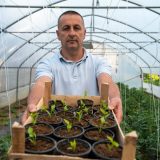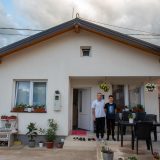Six years and five rentals later, the search for a new home ends for the Fejzić family from Kolići, thanks to the European Union.
A memory of one night in May 2014 is still fresh in the mind of fifty-year-old Mirsad Fejzić. Unprecedented amounts of rain and groundwater teamed up with the overflowing nearby Kolići stream, forcing the locals to leave their homes. Mirsad had a special mission that night – in search of safety from a natural disaster, he formed a column and led the family and locals uphill to a neighbouring village.
“I have no words to describe how that journey went. We moved along a slope, not daring to go down for five meters, with the soil all drenched in water, so you sink right there. You are taking your children, carrying the bags”, Fejzić recalls. “I spent four years in the war, and never did I turn my back on anything. But those moments were the hardest for me. Not a thing you can do.”
Kolići near Zenica are one of the villages most severely affected by landslides; homes of the locals there, including that of Fejzić, are still buried under debris and mud. Seven years later, he is still struggling to hold back his emotions.
“When the villagers of Smajić saw us… they thought we all died down there that night,” he recalls, adding that due to heavy rains and unusual storms, there was no phone signal in the village, coupled with a shortage of food and drinking water.
“Never saw that in any movie. Fighting hard for each other, to help, to rescue. Everyone crying up there – they couldn’t believe we survived,” he says. “We caught a bit of a phone signal and I made a call, helicopters came. The transfer took two days. Whatever was to be taken, we pulled it out. The army took the population. They were placed in the barracks.”
Frequent moving
Numerous villages and areas on the banks of rivers and streams in the Zenica-Doboj Canton are among the hardest hit by catastrophic floods and landslides, with one million in BiH affected in its aftermath.
The worst natural disaster in 120 years had led to an unprecedented crisis where some 90,000 were forced to leave their homes. In May 2014, Mirsad, his wife and three children, all moved into the first of five rentals they would be moving in and out from over the next six years in Zenica.
“As soon as you settle in, the owner comes to inform that the property is sold and you need to move. And the little that you have end up being destroyed from all the moving around,” he says. “Just when we started to lose hope, it happened.”
In September 2017, the Flood Recovery Programme was launched. Under its housing component, intended primarily for socially and economically vulnerable groups, a total of 423 new housing facilities have been built and 60o housing units in BiH rehabilitated.
In the area of the city of Zenica alone, 34 houses were built.
Coordinator with the Zenica City Administration, Danijela Dalmacija-Pavlović, has been engaged from the very start to help fellow citizens affected by floods and landslides. She remembers everything done so far and expresses personal satisfaction that the project was implemented on such a large scale in her city.
“It’s a major trauma, a major loss. Imagine having everything in your apartment, your home, and you are left with nothing. Well, they were literally left with nothing,” she recalls. “Those floods had that weight – they survived the war, they’ve been through it all, and then you end up once again with nothing. And they had to start from scratch all over again.”
With a 15 million euro programme funded by the European Union in co-operation with the Federation of Bosnia and Herzegovina, Republika Srpska, Zenica-Doboj Canton, local authorities and UNDP, some 3,000, much like Fejzić, now have permanent housing.
Agriculture
Mirsad Fejzić was raised and spent his entire life in the countryside. Zenica’s settlement of Klopče, where his new house is located, has conditions for him to engage in agriculture. Although serving on the Armed Forces of BiH, Mirsad, with the great help of his wife Mersima, successfully maintains greenhouse production. He was also provided a 100-square-meter greenhouse, including the accompanying raw materials and small equipment, all thanks to the Flood Recovery Programme.
“It’s different, when you know it’s yours. The house up there is still buried. I’m still going up, my orchard is up there, I’m sowing. I learned to live of agriculture. I worked in a company, but the barn was always full”, says Mirsad.
The older son and daughter, meanwhile, moved out and started their own families, so 15-year-old Salih has his own room in the new house.
The Fejzić family are also satisfied with the support for their agricultural production. During the year they say they can produce up to 800 to 900 kilograms of tomatoes, provide healthy food all summer, during the winter they have fresh spinach, spring onions and lettuce.
The Flood Recovery Programme is implemented by UNDP in BiH, jointly with the International Organization for Migration (IOM), the Arbeiter-Samariter-Bund (ASB), Hilfswerk International (HWI) and partner municipalities and cities.







